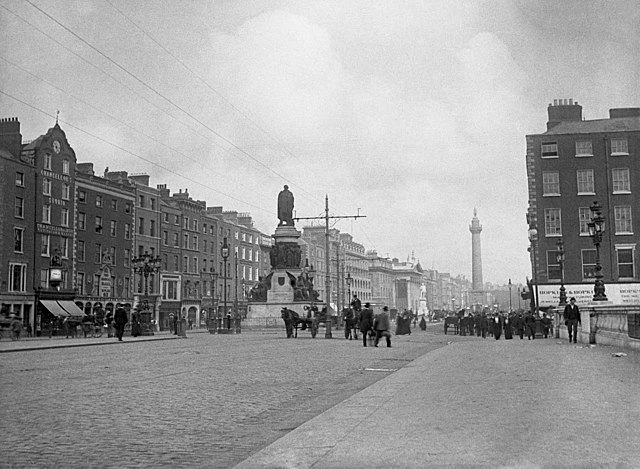Ulysses was published in 1922, but banned in the United States for over ten years for being obscene. My Modern Library edition includes the text of Judge John M. Woosley’s 1933 decision, which lifted the ban. What a debt we owe His Honor!

I’ve nothing to add to the body of scholarship on this momentous work, but I do want to record some thoughts as an invitation to others to take it on, because reading it is a project but a project worthy of your time.
What prerequisites are necessary for reading Ulysses?
None, really. This book is great and stands on its own. So how much you want to read beforehand depends on how much of Joyce’s nods to other literature you want to catch (and I can’t imagine anyone getting it all) vs. how much you are willing to roll along and enjoy the scenery. It’s fun that Ulysses exists in conversation with so many other works, but the best parts of the book are the beautiful writing and the appeal of the humanity of the characters, which I think would come through just fine even if you dove right in, which, incidentally I did not.
Similarly, I do not think it is necessary to read in French, Latin, Italian, and German to read the novel. It sounds intimidating to say that there’s five languages in there — oh and probably some Gaelic too — but its a line or two here and there, and you have context to work with.
What did I read, then, in preparation?
How to Read Literature Like a Professor, by Thomas C. Foster – My quest began with this book, an accessible guide to getting more out of reading by reading and appreciating great literature- and, most of all, having fun reading. This was essential to me as a bookseller with basically no background in literature. Foster recommends dozens of works but 4 most of all: Song of Solomon, Great Expectations, One Hundred Years of Solitude, and Ulysses.
The Odyssey, Homer – The Odyssey provides the structure of Ulysses (latinized name of Odysseus). It was fun to recognize the cyclops, and the sirens, but I think the importance of this whole connection might be overblown. It is interesting to compare Odysseus to Bloom, though. What qualities were considered heroic in the 8th century BC, vs. what qualities were considered heroic in 1920?
Dubliners and Portrait of the Artist of a Young Man – These help get a reader accustomed to Joyce’s style, kind of a way of putting a toe in the water within a format that will be more familiar to people who have read more, um ,normal novels than Ulysses. You will also know a bit more about Stephen, one of the central characters. Somewhat useful.
Hamlet, Shakespeare- This was the easiest and most useful thing I read to prepare for reading Ulysses and I would almost call it a prerequisite. If you’re not familiar it is hilarious, brief, and- like Ulysses and the Odyssey– it is a father/son story full of human folly.
The New Testament, Primary education: Stephen grew up in Catholicism in the late 19th century, as did Joyce, Leopold Bloom is a convert from a family of Jewish immigrants. My experience of 8 years Catholic primary school helped the novel resonate with me, although it is not as pertinent as it was in Portrait of the Artist.
This guide, by Patrick Hastings, was an essential companion in the past 3 months. Did not read all of it but anytime I didn’t get something that seemed important, I turned to Hastings.
Is this book challenging?
Ulysses is challenging to read but very rewarding. I can easily imagine sitting down to read it again next year and getting even more out of it. Joyce knew very well how good he was at writing, and some of the book is just show-offy. Like, ‘so you think I can’t write one chapter that demonstrates my mastery of 32 different styles of literature? Hold my beer.’ So there are some parts that were more fun for Joyce to write than for us to read. Other parts are pure joy. The totality is unforgettable and unlike any other book.
What’s this all about then?
This book is set on a single day in 1904 and follows life in Dublin, Ireland (then under British rule), mostly centered around 2 characters, Stephen Dedalus and Leopold Bloom. I don’t think it would be much of a leap to say both characters are Joyce himself, Dedalus is the age that Joyce was in 1904, and a writer confident in his own brilliance, Bloom is the age Joyce was while writing the book in 1920, an advertiser of much more modest talents. Is this the humility of middle age? Or is Joyce saying I’m Dedalus and the rest of you dumdums are all Blooms? They cover some ground in this day, Stephen going about philosophizing and getting rather inebriated, Leopold avoiding going home so as not to interrupt his wife cheating on him and ending up spending the wee hours of the morning in conversation with Stephen.
What questions are likely to lodge in the mind of the reader?
What if you could meet your younger self? Would young you recognize a like mind and appreciate the opportunity? Could older you bridge the gap? Can connections live up to expectation?
List other themes that arise repeatedly in the lengthy text?
Colonialism, fatherhood, sexuality, fertility, loyalty, education, faith, anti-semitism, xenophobia, nationalism, generosity (true and affected), marriage, death.
Leave a Reply
You must be logged in to post a comment.